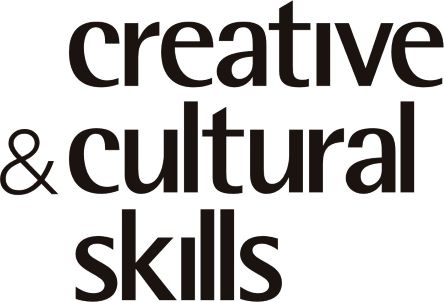As we get ready for next week’s online Creative and Cultural Careers Festival (CCCF), 1st – 5th March 2021, we are delighted to feature this guest blog by Kathryn Willens, Head of Partnerships Scotland at Creative & Cultural Skills (CCSkills), who provides an extremely helpful overview of the industry.
1. COVID-19 has hit the Creative and Cultural sector hard…
First things first and no doubt about it: COVID-19 has rocked the cultural sector. Globally, across the UK and, of course, in Scotland. Even now, one year on since the first national lockdown, uncertainty prevails: it remains hard for cultural employers and organisations to plan ahead, and the full extent of job losses is unknowable until furlough comes to a definitive end (in Scotland, it’s estimated that on average 60% of employees in Arts, Entertainment and Recreation have been furloughed)1.
However, there’s also better news.
2. … but it will bounce back
The creative industries are key to boosting productivity, employment, innovation and skills. When the sector fully opens its doors again, it will need new talent with new ideas to help it recover and excel. And despite the global pandemic, medium-term forecasts for Scotland (2021-2023) predict job growth and opportunities1.
We already know that film & TV production remains strong, with Scotland’s multiple production studios all performing well (First Stage Studios, Pyramids Studios, Wardpark Studios, BBC Pacific Quay), and the Kelvin Halls Studio project in Glasgow now in development. Unsurprisingly, we are also witnessing an exciting creative digital production boom in animation, games, post-production, VFX, design, apps and online.
The cultural sector and creative industries also have a tremendous track record in responding to challenges, reinvention and bouncing back stronger. Following the global financial crisis in 2008, our world-leading creative industries became the UK’s fastest growing and second-largest sector, accounting for about a quarter of the UK economy.
At CCSkills, we are working to create a fair and skilled cultural sector to ensure that as they rebuild, employers in the creative industries embrace the widest possible pool of available talent from across all communities of the UK.
So now it’s your time to think forward and think to the future.
3. Think broadly about all available opportunities
The work of CCSkills covers craft, cultural heritage, design, literature, music, performing arts and visual arts. Meanwhile, the Scottish Government describes the creative industries as those with an origin in individual creativity, skill or talent, or that have the potential to create wealth and jobs through the development and production or exploitation of intellectual property. This definition covers advertising, architecture, visual art, crafts, fashion and textiles, design, performing arts, music, photography, film and video, computer games, radio and TV, writing and publishing, heritage, software/electronic publishing and cultural education.
Job roles and occupation types are varied, cross-cutting and often cutting-edge, from artists, designers, makers, performers and writers to roles in producing, planning, scheduling & programming, customers, audiences & services, preservation & conservation and business… The Discover! Creative Careers finder is a useful online tool worth exploring. It features 500+ job descriptions and case studies to showcase the full gamut of opportunities available in the creative industries.
Think broadly and you will find opportunities to uncover.
4. WANTED: Skills!
Creative and cultural employers continue to emphasise the need for transferable, core skills: across sub-sectors, communication, networking, relationship-building and working collaboratively are all crucially important.
At CCSkills, we have identified that the more common skills gaps continue to be in marketing & communications, problem solving, business support, fundraising and social media. Digital skills of all kind are vital and in high demand. And it’s essential to develop and maintain a professional online presence and portfolio.
And while accepted wisdom suggests that you need to be ‘arty’, able to act, dance, sing, or paint to work in the cultural sector, in truth, almost 50% of our sector’s jobs are “non-creative”.
In the creative industries, small and micro businesses predominate and, UK-wide, around 35% of the workforce are self-employed.
Take every opportunity, therefore, to enhance your core skills, build up experience in areas where the sector has skills gaps and develop skills in flexible thinking and entrepreneurial working.
5. New talent brings in new ideas
COVID or not, the creative and cultural sector exists in a constant state of change. Some of the jobs people will do in 10 or 15 years do not yet exist. Therein lies opportunity.
So, think about the importance of defining your own values and find ways to relate them to your career choices and goals. You can also change directions and veer off track. In that space lies new experiences and a space to foster new ideas.
About Creative & Cultural Skills
Creative & Cultural Skills is a UK charity working to create a fair and skilled cultural sector by shaping skills, education and employment best practice. We provoke action and enable learning opportunities that drive change and help build an inclusive skilled sector by:
- informing and helping the sector respond to changes in the vocational education system
- helping employers see the benefits of an inclusive workforce
- improving understanding and awareness of the career options across the cultural sector, in turn feeding new talent into the workforce
- supporting the sector to continue on its course of economic growth and meet diversity ambitions.
Get in touch
- Sign up to the CCSkills Newsletter and follow us on:
- Kathryn Willens, Head of Partnerships Scotland
- kathryn.willens@ccskills.org.uk
Parting advice…
Make your mark. Bring your diverse and valuable experience of studying through a global pandemic. The skills you have gained. The resilience earned. Add your native digital skills into the mix.
Be bold, be confident, follow your dreams. Believe.
Thanks Kathryn
1Data from Skills Development Scotland’s Creative Industries Sectoral Skills Assessment, February 2021
(Image credit: CCSkills)


